It is important to understand what voting rights EU citizens have when residing in Britain in various immigration statuses. In the UK, voting rights depend on nationality, residency, and agreements that compete under law. The rules that govern EU nationals are different for British citizens and for all other nationalities. This article explains the rules, eligibility criteria, and developments affecting EU citizens’ voting rights in UK general elections.
Overview of Voting Rights in the UK
The UK has laws around who can vote that depend entirely on the various elections in Britain. As such, British citizens have maximum rights to vote, but things are more intricate for foreign nationals, including EU citizens. Who is eligible to vote is defined by legislation, namely the Representation of the People Acts, and they define eligibility differently for general, local, and devolved elections.
EU Citizen’s Voting Rights Before Brexit
In the time leading up to when the UK left the EU, EU citizens living in Britain had the debated ability to vote in local elections and elections for the European Parliament but did not vote in general elections in the UK, and this was based on reciprocal arrangements under EU law that included some civic rights and freedom of movement for EU nationals.

Current Rules for EU Citizens in UK General Elections
UK law is quite clear in determining eligibility to vote at a general election, and the rules concerning EU citizens are extremely restrictive. As a general rule, most EU citizens living in the UK cannot vote in parliamentary elections with pre-settled status, settled status, or indefinite leave to remain.
Although they may have lived in the UK for many years, the restrictions placed on voters are nationality-based, not residency-based, and years of residence do not alter eligibility. Thus, only British, Irish, or a select category of Commonwealth citizens can be eligible to vote in a general election, and specifically the legislation strengthened voting rules against EU citizens, particularly on the back of Brexit, thus abolishing the previous automatic eligibility.
No General Election Voting Right for Most EU Citizens
Current legislation determines there can be no voting rights for most EU citizens at the general election level. Most EU citizens do not qualify to vote in UK general elections, and in fact, pre-settled suspected and settled status do not apply in matters of voting. Even if someone has lived in the UK for a long time or they have permanent rights, they cannot vote unless they also happen to be a British citizen, Irish citizen, or qualifying Commonwealth citizen.
The restriction itself is constant throughout the UK and across all jurisdictions. In effect, this means while EU citizens can vote in other elections, they cannot vote to elect Members of Parliament. Overall, the policy obviously reflects the UK’s stance on electing Members of Parliament, i.e., the greater their legal and historic connection to the UK, the greater their perceived eligibility to vote generally.

Reciprocal Agreements with Specific Countries
With Brexit, the UK entered into bilateral treaties with a few EU countries. For example, Spain, Portugal, and Luxembourg allow their nationals to cast votes in local elections within the UK. The agreements were not extended to the general elections. It means such nationals can vote for their local councillors or mayors but cannot participate in electing Members of Parliament.
There is a difference between local and national voting rights, which is one of the provisions in the UK electoral law. Many EU residents have misunderstood that barrier, though. A citizen from such a country would have no right to parliamentary election rights except by birth from one of the eligible nationalities to general elections.
Eligibility Requirements Under UK General Election Rules
Voting in UK general elections is restricted by nationality, age, and registration to certain categories of people. The largest categories are British citizens, Irish citizens, and certain Commonwealth citizens. All must be at least 18 years old and registered to vote in the constituency in which they reside.
Simply being a citizen of the EU provides no eligibility right for a general election vote. The rules preserve the question of who can vote with some legal or historical basis to vote in an election for the Parliament of the United Kingdom.
British Citizens
British citizens are guaranteed their right to vote in general elections once they turn 18 and are registered on the electoral roll. These rights are granted to individuals regardless of whether the individual is a citizen or whether the person resides in the UK or overseas, albeit overseas citizens must ordinarily re-register within the context of overall rules.
The law provides this right to all UK nationals automatically, whether they are British citizens or not and regardless of their immigration status or domicile. If a British citizen is resident overseas, they are permitted to vote by proxy or by post in order to facilitate voting. British citizens are a certain subset of voters within the overall electorate at UK general elections, and at the heart of the voting system is the principle that the decisions of parliament shall be made in the main for the benefit of British nationals.

Irish Citizens
Irish citizens living in the UK have the same rights to vote in general elections as British citizens. This is due to the long-standing Common Travel Area (CTA) agreement between the two countries. This right applies regardless of how long they have been living in the UK and any other residency type. Irish nationals, by virtue of being eligible to vote, simply need to meet the age and registration requirements. There are few foreign nationals allowed to vote in UK parliamentary elections, and Irish citizens are one.
Commonwealth Citizens
Commonwealth citizens are entitled to vote in a general election in the UK if they have leave to remain in the UK or if they do not need leave under immigration law. The eligibility criteria also include being at least 18 years of age and being registered in the constituency.
This rule applies to nationals from all the countries that are members of the Commonwealth of Nations, the right again based on the historic and political connection the UK has with those countries. Once they are registered, Commonwealth citizens will be treated the same way as British and Irish citizens and can vote in parliamentary elections.


